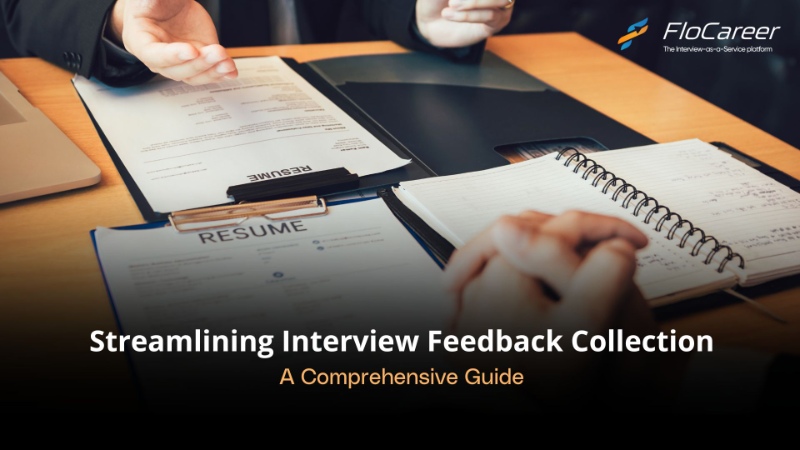Streamlining Interview Feedback Collection: A Comprehensive Guide
Recruitment processes come with their own set of complexities, and amidst the challenges faced by recruiters, one particular pain point often stands out - the delay in collecting interview feedback from interviewers. This bottleneck in the hiring process can be time-consuming, inefficient, and prone to delays, affecting overall recruitment timelines and potentially leading to the loss of top-notch candidates. In this article, we will delve into four effective ways to efficiently collect interview feedback, understanding the significance of interviewer feedback and addressing the challenges faced in this crucial phase of the hiring process.

Efficient Ways to Collect Interview Feedback
1. Establishing a Successful Interview Plan
One common hurdle faced by interviewers is the lack of clarity on what aspects to evaluate during interviews, resulting in unstructured assessments. To counter this, clear guidelines and expectations should be set for interviewers. Defining key skills, competencies, and behaviors for assessment helps create a structured interview process, enabling more targeted and insightful feedback.
2. Enabling Real-Time Feedback Filling
The tight schedules of interviewers often lead to time constraints for providing feedback after interviews. Leveraging technology to enable real-time feedback filling can be a game-changer. By providing interviewers with tools or applications allowing them to input feedback during the interview, organizations can ensure timely capture of observations, enhancing the accuracy and completeness of feedback.
3. AI Assistance for Subjective Feedback
The arduous task of writing lengthy subjective assessment forms can be a drain on interviewers' productivity. AI-powered tools, such as FloCareer, offer assistance in generating interview notes and detailed feedback. Utilizing natural language processing and machine learning, these tools automate the note-taking and feedback writing process, reducing the time spent on feedback loops and allowing interviewers to focus on core responsibilities.
4. Implementing Automated Reminders
Automated reminders for filling interview feedback play a pivotal role in streamlining the collection process. Leveraging technology solutions like applicant tracking systems (ATS) or interview platforms, such as FloCareer, recruiters can automate reminders to interviewers. This ensures timely submission of feedback, eliminates the need for manual follow-ups, and helps maintain the momentum of the recruitment process.
The Significance of Interviewer Feedback
Understanding the importance of providing feedback after interviews is crucial for optimizing the hiring process. Key reasons include:
Candidate Evaluation: Interviewer feedback provides valuable insights into a candidate's performance, skills, and cultural fit, assisting recruiters in making informed hiring decisions.
Collaboration: Feedback from multiple interviewers fosters collaboration among the hiring team, ensuring a well-rounded assessment and reducing individual biases.
Candidate Experience: Timely feedback contributes to a positive candidate experience, conveying professionalism and respect for candidates' time, ultimately enhancing the employer brand.
Challenges in Collecting Interview Feedback
Recruiters often encounter challenges when collecting feedback from interviewers, including:
Lack of Timeliness: Obtaining prompt feedback from interviewers is challenging due to their existing responsibilities, resulting in prolonged hiring cycles.
Inconsistency: Interviewer feedback may vary in quality, consistency, and relevance, hindering fair and accurate candidate evaluations.
Manual Processes: Traditional methods involving manual documentation, spreadsheets, or email exchanges are time-consuming, error-prone, and susceptible to miscommunication.
Impact of Delayed Interview Feedback on Recruitment
The challenges mentioned above can have adverse effects on the recruitment process, such as:
Delayed Decision-Making: Without timely feedback, recruiters struggle to make informed decisions promptly, leading to extended recruitment cycles and potential loss of top candidates.
Inaccurate Candidate Assessment: Inconsistent or inadequate feedback can result in inaccurate candidate assessments, impeding recruiters from identifying the best-fit candidates.
Overcoming Challenges and Enhancing Recruitment Efficiency
Collecting interview feedback remains a significant challenge, impacting recruitment timelines and candidate experience. However, by addressing challenges through standardized interview assessment criteria, leveraging technology solutions and AI tools, recruiters can streamline the feedback collection process. Adopting these strategies not only increases recruitment efficiency but also contributes to a positive candidate experience and successful hiring outcomes.
In the pursuit of refined hiring practices, consider incorporating FloCareer into your recruitment strategy. Outsourcing interviews with FloCareer ensures unbiased assessments, promoting diversity and innovation in your workforce.
Check out our latest blog on mastering interviews


